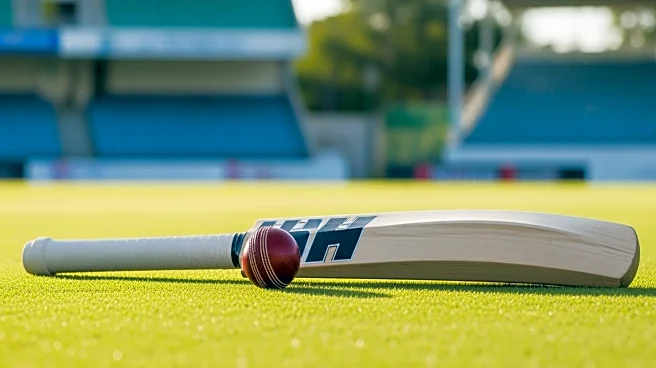What's Happening?
South Africa's women's cricket team achieved a dominant victory over Pakistan in the ICC Women's World Cup, winning by 150 runs via the DLS method. Marizanne Kapp played a crucial role, scoring an unbeaten 68 and taking three wickets for 20 runs. South Africa posted
a total of 312 for 9 in a rain-affected match, with Laura Wolvaardt contributing 90 runs. Pakistan struggled in their chase, finishing with 83 for 7. This win marks South Africa's fifth consecutive victory, propelling them to the top of the points table and securing their spot in the semi-finals.
Why It's Important?
South Africa's victory against Pakistan underscores their strong performance in the ICC Women's World Cup, showcasing their ability to compete at the highest level. The team's success is significant for South African cricket, as it boosts their confidence and positions them as strong contenders for the title. The win also highlights the importance of experienced players like Marizanne Kapp, whose contributions are vital for the team's success. As South Africa prepares for their next match against Australia, their performance in the tournament could have implications for their standing in international women's cricket.
What's Next?
South Africa will face Australia in their final group-stage match, aiming to maintain their top position in the points table. A victory would solidify their status as one of the leading teams in the tournament and enhance their chances in the semi-finals. The team's focus will be on maintaining their momentum and addressing any weaknesses to ensure continued success. The outcome of the match against Australia will be crucial in determining their path in the tournament and their potential to win the World Cup.
Beyond the Headlines
South Africa's success in the ICC Women's World Cup reflects broader trends in women's sports, where increased investment and support are leading to improved performances and greater visibility. The team's achievements can inspire young girls in South Africa to pursue cricket and other sports, contributing to gender equality and empowerment. As women's cricket gains popularity, it challenges traditional gender norms and promotes inclusivity, fostering a more equitable sports culture.















